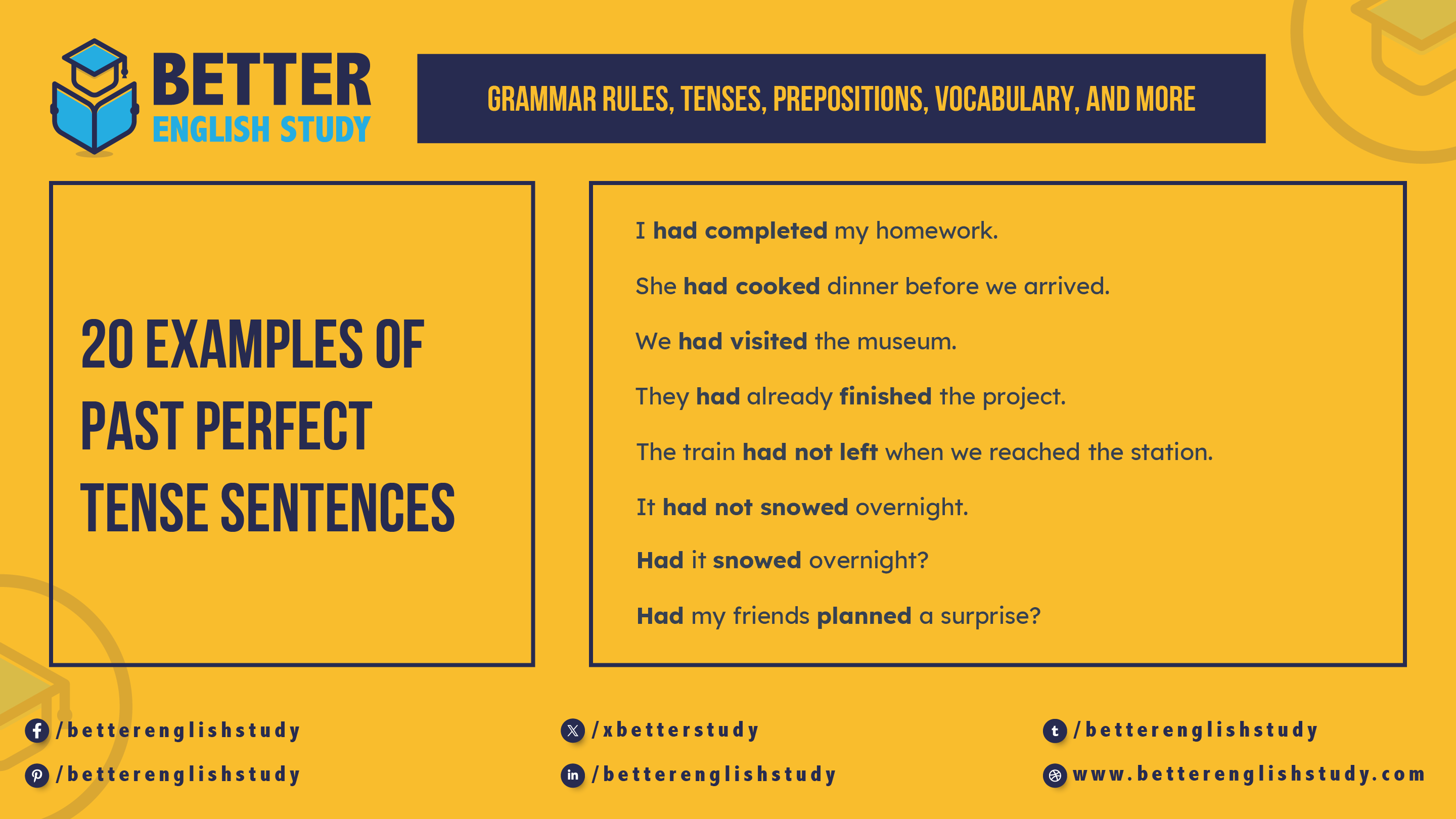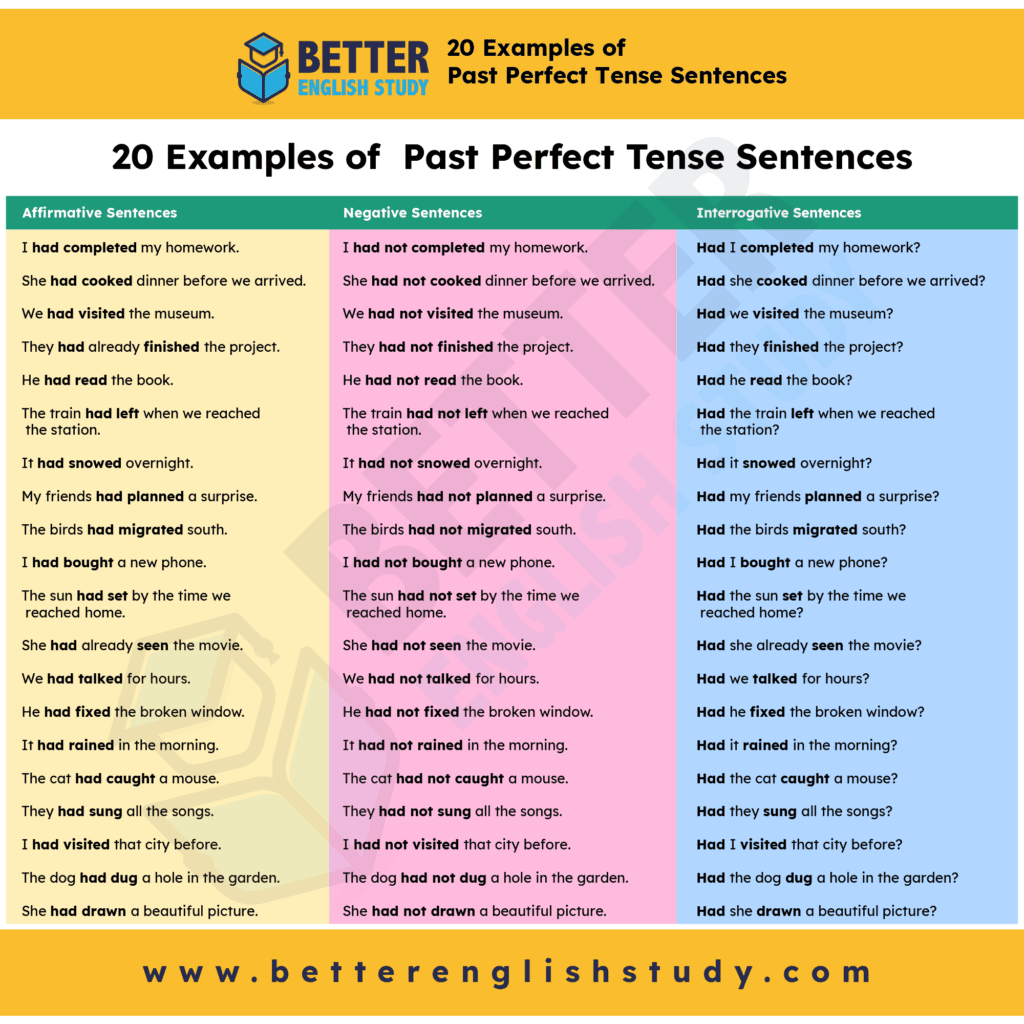
In the intricate tapestry of English grammar, understanding various verb tenses is paramount for effective communication. Today, let’s unravel the nuances of the past perfect tense.
This linguistic tool allows us to convey the sequence of events that occurred in the past. The past perfect tense provides a temporal anchor, enabling us to clarify which event transpired before another.
In this article, we will explore examples of past perfect tense sentences, aiding language enthusiasts in mastering this crucial element of English grammar.
Past Perfect Tense
Before we dive into examples, let’s establish a foundational understanding of the past perfect tense. This tense articulates actions completed before another action took place in the past.
It is formed by using the past tense of the auxiliary verb “to have” (had) and adding the past participle of the main verb.
Formula for Past Perfect Tense
- Affirmative (Positive): Subject + had + past participle of the verb + object.
- Negative: Subject + had not + past participle of the verb + object.
- Interrogative (Question): Had + subject + past participle of the verb + object?
Now, let’s clear up this concept through various examples.
1. Past Perfect Tense Examples: Affirmative Sentences
- I had completed my homework.
- She had cooked dinner before we arrived.
- We had visited the museum.
- They had already finished the project.
- He had read the book.
- The train had left when we reached the station.
- It had snowed overnight.
- My friends had planned a surprise.
- The birds had migrated south.
- I had bought a new phone.
- The sun had set by the time we reached home.
- She had already seen the movie.
- We had talked for hours.
- He had fixed the broken window.
- It had rained in the morning.
- The cat had caught a mouse.
- They had sung all the songs.
- I had visited that city before.
- The dog had dug a hole in the garden.
- She had drawn a beautiful picture.

2. Past Perfect Tense Examples: Negative Sentences
- I had not completed my homework.
- She had not cooked dinner before we arrived.
- We had not visited the museum.
- They had not finished the project.
- He had not read the book.
- The train had not left when we reached the station.
- It had not snowed overnight.
- My friends had not planned a surprise.
- The birds had not migrated south.
- I had not bought a new phone.
- The sun had not set by the time we reached home.
- She had not seen the movie.
- We had not talked for hours.
- He had not fixed the broken window.
- It had not rained in the morning.
- The cat had not caught a mouse.
- They had not sung all the songs.
- I had not visited that city before.
- The dog had not dug a hole in the garden.
- She had not drawn a beautiful picture.
3. Past Perfect Tense Examples: Interrogative Sentences
- Had I completed my homework?
- Had she cooked dinner before we arrived?
- Had we visited the museum?
- Had they finished the project?
- Had he read the book?
- Had the train left when we reached the station?
- Had it snowed overnight?
- Had my friends planned a surprise?
- Had the birds migrated south?
- Had I bought a new phone?
- Had the sun set by the time we reached home?
- Had she already seen the movie?
- Had we talked for hours?
- Had he fixed the broken window?
- Had it rained in the morning?
- Had the cat caught a mouse?
- Had they sung all the songs?
- Had I visited that city before?
- Had the dog dug a hole in the garden?
- Had she drawn a beautiful picture?
Great job! You’ve successfully explored the past perfect tense.
Remember to incorporate these structures into your practice, and soon, you’ll be easily expressing past actions. Keep up the fantastic work on your language journey!
